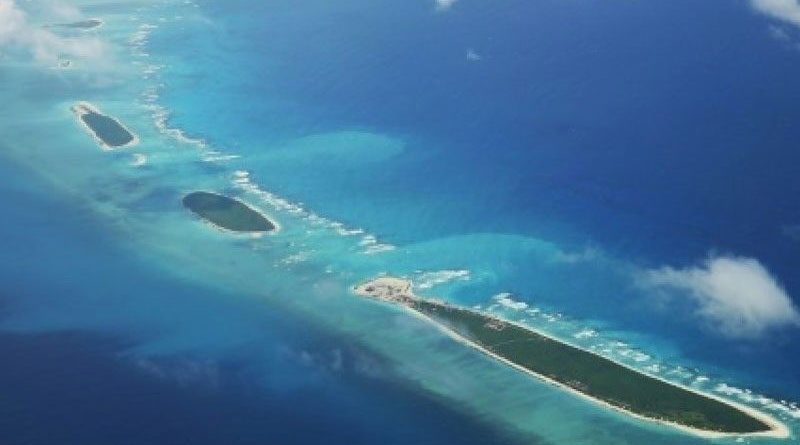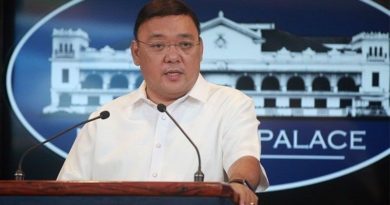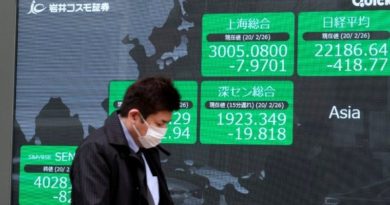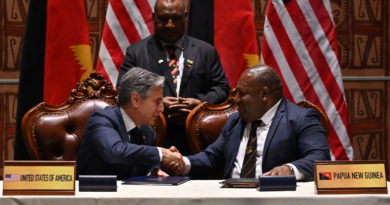HEADLINE-ASIA GEOPOLITICS | G7 calls out China over intimidation
In its communiqué, the G7 also said China’s vast maritime claims in the SCS have no legal leg to stand on.
.
.
‘No legal basis for expansive maritime claims in SCS’
.

MANILA, Philippines — Seven of the world’s most powerful democracies comprising the Group of Seven (G7) have issued a joint communiqué calling on China to stop its militarization of the South China Sea (SCS) and denouncing its use of dangerous maneuvers and water cannons against Philippine vessels.
The issuance of the communiqué dated April 19 came after their Foreign Ministers’ Meeting held in Capri, Italy. The G7 includes Canada, France, Germany, Italy, Japan, the United Kingdom and the United States. The European Union (EU) is a “non-enumerated” member.
In its communiqué, the G7 also said China’s vast maritime claims in the SCS have no legal leg to stand on.
“There is no legal basis for China’s expansive maritime claims in the South China Sea, and we oppose China’s militarization, coercive and intimidation activities in the South China Sea,” the G7 said in the communiqué.
“We continue to oppose China’s dangerous use of coast guard and maritime militia in the South China Sea and its repeated obstruction of countries’ high seas freedom of navigation and we express serious concern about the increasing use of dangerous maneuvers and water cannons against Philippine vessels in this regard,” the G7 declared in its statement.
“We are seriously concerned about the situation in the East and South China Seas and reiterate our strong opposition to any unilateral attempts to change the status quo by force or coercion,” the joint statement read.
The group also emphasized “the universal and unified character of the United Nations Convention on the Law of the Sea (UNCLOS)” and reaffirmed the international law’s “important role in setting out the legal framework that governs all activities in the oceans and the seas.”
The group also reiterated its recognition of the Arbitral Tribunal ruling on July 12, 2016, calling it “a significant milestone, which is legally binding upon the parties to those proceedings and a useful basis for peacefully resolving disputes between the parties.”
The ruling, issued by the Permanent Court of Arbitration based in The Hague, invalidated China’s vast claims in the South China Sea and reaffirmed the Philippines’ maritime entitlements.
The G7 also reiterated “our commitment to promoting a cooperative system of international governance for the ocean and seas and to maintaining the rules-based maritime order based on international law, in particular the UN Convention on the Law of the Sea (UNCLOS) and the principles of territorial integrity, sovereignty, peaceful resolution of disputes, fundamental freedoms and human rights.”
“In this context, we recognize the importance of the role of international courts and tribunals, including the International Tribunal for the Law of the Sea,” the G7 communiqué stated.
The G7 issued similar statements last year during its Leaders’ Summit in Hiroshima, Japan where US President Joe Biden reassured Japanese Prime Minister Fumio Kishida of US commitment to ensuring a free and open Indo-Pacific Region amid China’s unsettling behavior in the East and South China Seas as well as in the Taiwan Strait.
More international support
The release of the G7 communiqué came as former Armed Forces of the Philippines (AFP) chief Emmanuel Bautista cited the need – at a forum on Thursday – for broader international support for the Philippines’ response to China’s increasing aggressiveness in asserting its maritime claims.
He issued the statement during the two-day forum “The West Philippine Sea as Ground Zero of Emerging Risks and Opportunities” organized by Stratbase Institute in partnership with the United States Institute of Peace.
The forum brought together incumbent and former government officials, members of the diplomatic community, scholars and policy experts to discuss the maritime security landscape in the West Philippine Sea and explore avenues for cooperation with like-minded countries.
In his presentation, Bautista recalled that only 21 countries expressed support for the Philippines after Chinese coast guard ships again made dangerous maneuvers and used water cannons to stop Filipino vessels from delivering supplies and provisions to troops stationed on BRP Sierra Madre in Ayungin (Second Thomas) Shoal in March.
“We saw 21 countries support us in that incident but these are just 21 countries. There are over 100 countries around the world,” Bautista said.
“And note that the 21 countries we’re talking about, none of them are Southeast Asian countries, which are the most important,” he added.
“We hope more will speak out. We hope, especially, that our brothers in Southeast Asia will also speak out,” the former military chief added.
Bautista acknowledged that there is no enforcement mechanism for the 2016 arbitral ruling that recognized the Philippines’ sovereign rights over areas within its exclusive economic zone in the West Philippine Sea.
“But if all of us speak out, I mean the international community, then that will result in social pressure on any errant state,” he said.
In his opening statement at the forum, Stratbase Institute president Dindo Manhit condemned China’s gray zone tactics, which “seek to destabilize a rules-based international order.”
“Our country continues to encounter such attacks in the West Philippine Sea in the form of shadowing, blocking, swarming strategies, laser incidents, water cannons and even intentional collision incidents,” Manhit said.
“I don’t see risk, I see opportunities for the Filipino nation. But it takes a whole of Philippine society approach. It takes the Philippines as a whole talking with the international community,” Manhit stressed.
Brian Harding, USIP’s senior expert on Southeast Asia and the Pacific Islands, noted how the situation in the West Philippine Sea has “escalated” over the last few months but with the Philippines’ position getting “much stronger than it was.”
“Certainly, the US-Philippines alliance has continued to build and deepen. There’s much more trust and I think this trilateral relationship, it’s pretty extraordinary – how this US-Japan-Philippines trilateral has come together,” Harding said.
He was referring to the April 12 trilateral summit among President Marcos, Biden, Kishida in Washington, which China denounced.
USIP senior program analyst Rosie Levine highlighted new developments in joint patrols, like the one conducted by the Philippines, US, Japan and Australia recently.
“This deterrence architecture that’s really meant to send the signal to China in a coordinated way that the Philippines isn’t alone… This is a united approach. It’s going to be much harder to pressure any individual actor as long as that architecture is in place,” Levine said.
Transparency
China has maintained its posture in the issue as the “Goliath,” according to Philippine Coast Guard Commodore Jay Tarriela, who is also spokesman on the West Philippine Sea issue.
“They never really wanted the international community to be aware of whatever provocative actions, bullying behavior, illegal presence that they do,” he said, referring to the Chinese.
Tarriela explained that transparency has been the Philippines’ response under President Marcos.
“How can you be able to gain support from the international community to support the modernization of the Armed Forces of the Philippines, the capacity-building of the Coast Guard if you do not even expose the problems that you are experiencing with the Chinese government?”
But he clarified that transparency is not an end-all strategy. “Our President still has a diplomatic channel for talking to China. We didn’t close our diplomatic relationship with them. There are still a lot of national instruments that he can be able to make use of,” Tarriela pointed out.
Philippine Navy spokesman Commodore Roy Vincent Trinidad cited recent administration announcement of the implementation of a Comprehensive Archipelagic Defense Concept, which is focused more on external security. “That will allow us to preserve, secure and protect all that is ours,” he said.
AFP spokesperson Col. Francel Margareth Padilla-Taborlupa said the country is also beefing up military bases in strategic points and improving the rotation and resupply missions’ operational mix.
“We’d like to emphasize that with whatever the Armed Forces are having actions in terms of our RORE missions in this West Philippine issue, we always have that foundation that we have the law on our side,” Taborlupa said.
“So we have to be the bigger person, we have to be the gentleman in the room and you know, exercise all restraint, because we know that the support of the international community and international law is on the Philippines’ side,” she added.


 Memento Maxima Digital Marketing
Memento Maxima Digital Marketing







